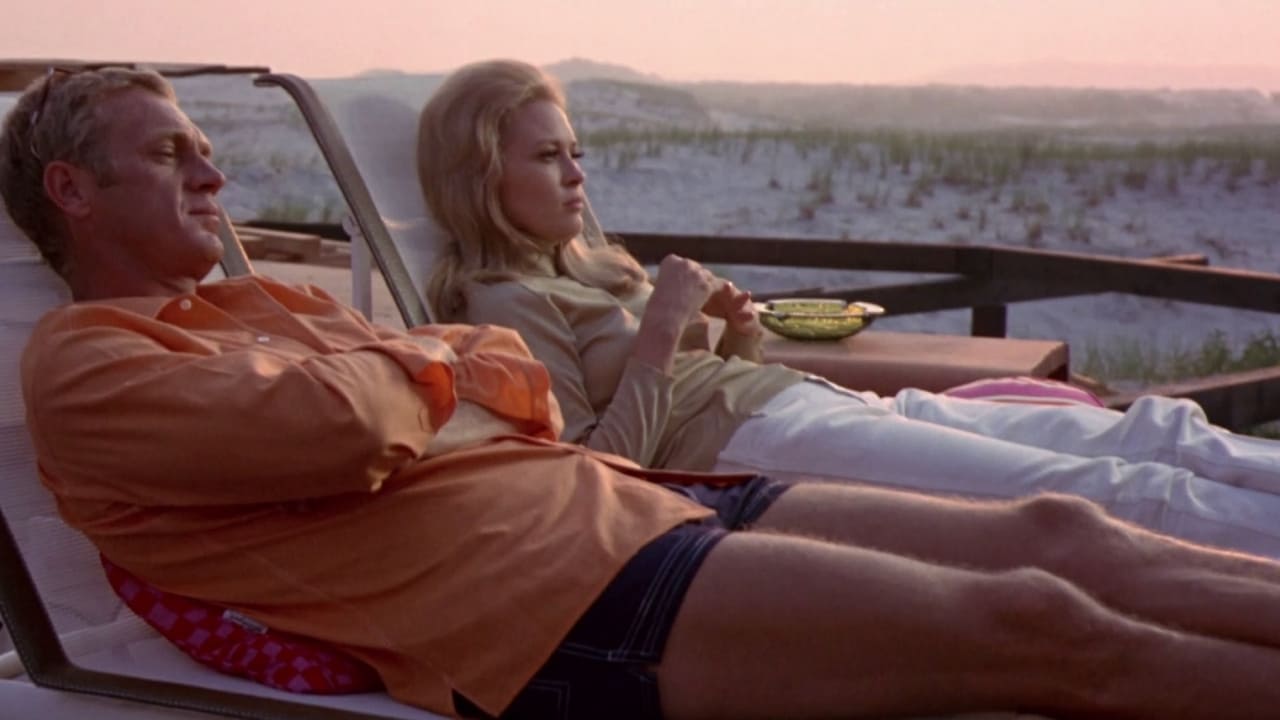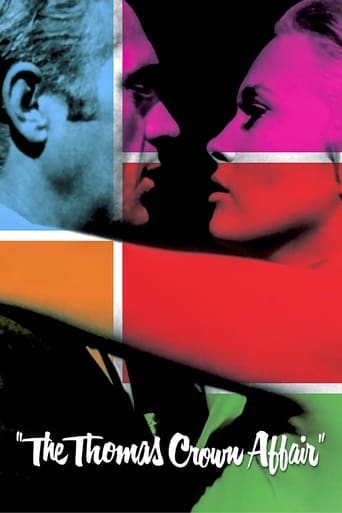

The blatant miscasting of both Steve McQueen and Faye Dunaway is one reason why the heist movie "The Thomas Crown Affair" doesn't work for me. He's a high-class entrepenurial criminal and she's the insurance investigator who's on to him; they're like Ken and Barbie playing at being grown-ups. It was directed by Norman Jewison, hot from his success with "In the Heat of the Night" and this time he's aiming at cool. Dunaway and McQueen are cool alright but they are also all wrong. It's a clever picture that revels in its own cleverness, (and use of the split-screen), and it was a huge success but it's also not nearly as clever as it thinks it is.
... View MoreWhat does a late 1960s playboy who has everything do with his time? How about pull off the ultimate robbery and just for the ever-loving hell of it? That's just what Steve McQueen manages to do as the title character in director Norman Jewison's 1968 crime film THE THOMAS CROWN AFFAIR. McQueen was one of those actors that is depressingly rare in today's high-glamor, hardcore violent Hollywood: an actor where you only have to look at him to know exactly what he is thinking. He's a rich, successful bank executive who's got so much money and leads such a playboy lifestyle; and yet, he is so bored that, perhaps just for entertainment purposes, he concocts a scheme to rob a bank in Boston, initiated by four associates of his. It seems like the perfect crime. But he hasn't counted on a gorgeous insurance investigator, played by Faye Dunaway, finding her way into his life in an attempt to nail him for this huge heist. And at the same time, Dunaway hasn't counted on her quarry's warped nature either.This is just simply one of those films that takes you back on a time trip of sorts to a time when, after the old Hollywood studio system had collapsed and the way of making films got so radically changed, experimentation in editing, cinematography, and plot were the in things. With respect to THE THOMAS CROWN AFFAIR, that feeling is enhanced by the inventive direction of Norman Jewison, who had directed McQueen on 1965's THE CINCINNATI KID, and had also done IN THE HEAT OF THE NIGHT. Jewison, together with legendary cinematographer Haskell Wexler (who had worked with him on IN THE HEAT OF THE NIGHT), combines inventive editing styles and the use of split-screen, a technique later used by Brian DePalma in several of his films (including SISTERS and CARRIE), McQueen and Dunaway really do strike sparks in ways that not even Pierce Brosnan and Renee Russo could in the 1999 reworking of this movie. Jack Weston (one of the vicious heavies in 1967's WAIT UNTIL DARK), Yaphet Kotto (in an early role), Paul Burke, Gordon Pinsent, and Richard Bull also do good turns here, helped out by the original screenplay of Alan R. Trustman (who shortly thereafter co-wrote the screenplay for McQueen's mega-hit BULLITT).The film also features a lush orchestral score by French composer Michel LeGrand that also includes the Allan and Marilyn Bergman song "The Windmills Of Your Mind" (sung in the film by Noel Harrison, but better remembered in the version by Dusty Springfield that was a hit in the spring of 1969). "Windmills" itself won the 1968 Oscar for Best Song, and rightfully so.By our standards, the crime and sex may seem hopelessly tame, especially in comparison to, say, a Quentin Tarantino bloodbath; but with people like Jewison, McQueen, and Dunaway involved, THE THOMAS CROWN AFFAIR still ranks as one of the best of its genre type and its era.
... View MoreThe King of Cool, Steve McQueen, plays a wealthy businessman and thrill seeker who masterminds a bank heist for no other reason than personal gratification. Faye Dunaway plays an investigator who is able to connect him to the crime and falls in love with him over the course of her investigation.It's a slick, high gloss production with A list stars and a big time director in Norm Jewison. It's an engrossing plot with some intriguing police procedure, well played by McQueen and Dunaway. 1960s films always look great to me because of the filming technique used at the time, although you wouldn't necessarily be wrong if you said this one looks pretty dated. Our preoccupation with high technology was starting to show even in 1968. There are numerous scenes of big punchcard computers, electronically controlled typewriters and the like, all cutting edge stuff back then but pretty antique looking now. McQueen cruises around the beach in an orange dune buggy, an iconic 1960's image if there ever was one. While this movie has a pretty familiar crime drama at its core, there are some defects. The only reason McQueen gets implicated in the crime is Dunaway's wild guess that the mastermind shipped the money to Geneva in numbered bank accounts. The police don't have a smidgen of evidence that this actually happened, but he fits that profile, making numerous trips there shortly after the robbery. However, several others fit the profile as well, and she only focuses on McQueen because she finds him personally attractive, and her female instinct tells her that he's the one. As the movie goes on, they really don't get any hard evidence connecting McQueen to the crime. McQueen plays it close to the vest and implicates himself only by his silence and evasiveness on the subject- he never says he did or didn't do it. Only near the end does he tire of the cat and mouse game and tell Dunaway to call in and make a deal with the cops. That's the closest thing to an admission we get. The motivation behind the crime is a little uncertain and a little thin. Thomas Crown is a rich businessman who wouldn't seem to have any incentive to pull off this particular crime. He's a thrill seeker-piloting gliders, playing polo, etc., so we're invited to make the inference that this is just another way for him to get off. There's also a subtle suggestion that after his divorce life is empty, and maybe he doesn't care if he risks everything with this. They do set up Thomas Crown as a rich man who's got some disdain for other rich men, but there's no indication that he's punishing the bank for something, and he's got no problem risking his henchmen or the innocent public to pull off his bank robbery thrill. One man does get shot in the robbery, so although you like his character, you could easily argue that Thomas Crown is not a very sympathetic good guy and maybe actually a bad guy. Good guy or bad, McQueen gets the last laugh as another robbery takes place while he leaves Dunaway high and dry and escapes to rich man's paradise on a private plane.
... View MoreSteve McQueen is a filthy rich expert in securities and arbitrage living in the closest house to a palace in Boston. He and a handful of colleagues, all strangers to one another, pull off a major bank heist and make off with more than two million dollars. To recover the money, a beautiful and unorthodox insurance investigator, Faye Dunaway, is brought into the case. They fall in love, or apparently fall in love, and McQueen claims he will give the money back, since he already has all he wants.I realized by the end that some important plot points had escaped me. How come McQueen winds up with ALL the loot? Does Dunaway try to outfox him and send him to jail? And where is McQueen headed in that airliner? Does he leave Dunaway with nothing but a free Mercedes? It was directed by Norman Jewison and released in 1968, a good year for movies generally. It's stylish, yes, but the style is of the period and looks a little odd from our current perspective, like watching a 1942 musical featuring Tommy Dorsey and his band, and a lot of men in uniform jitterbugging with the bobby soxers.It isn't until Dunaway's close ups that you understand the impasto of eye make up in the late 60s. And her black eyelashes are the size of window awnings on an ordinary house. They must flap in a stiff wind. The clothes are tres chic. That's not necessarily bad. Dunaway has nice knees, but otherwise, what with hats the shape of flying saucers, she seems a sterile, odorless presence on the screen. McQueen only looks slightly uncomfortable in his three-piece suits, smoking those thin cigars or demonstrating his recklessness on a golf course.The prolonged scene of their playing chess at McQueens manse has been described as extremely sexy, a kind of foreplay or at least thirdplay, and I can see why. That's clearly what the director was aiming at. But if you're not particularly turned on by either Dunaway's or McQueen, or their characters, it turns into an extended chess match, and that's all.The musical score is of the period too. Very sophisticated in a jazzy and romantic way with Burt Bacharach vocals like ba-ba-dee ba-ba-dumb of the sort that were popular at the time. They are even more pronounced in "Butch Cassidy and the Sundance Kid." The score isn't at all objectionable. I kind of like it. But the faddish split-screens, ripped off from Andy Warhol's "Chelsea Girls" and infecting the screen for the next couple of years, is a distraction and a major nuisance.It's not a terrible movie. Some of the supporting players are quite good and the viewer gets a nice tour of Boston and environs. And it must have been successful because they recently remade it, just as Hollywood now remakes every movie that ever made a nickel. Movies are now based on television sitcoms or adventures, cartoon series, comic books, video games, and earlier successes. If we live long enough we should all witness a remake of Porter's "The Great Train Robbery" from 1903.
... View More